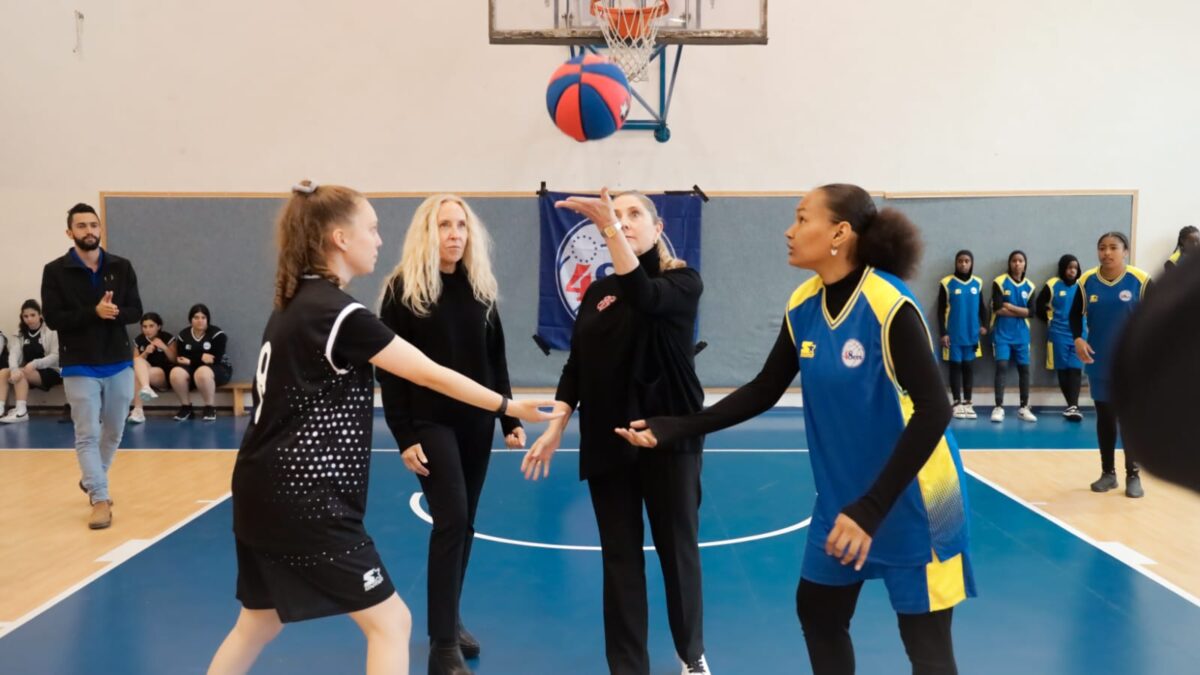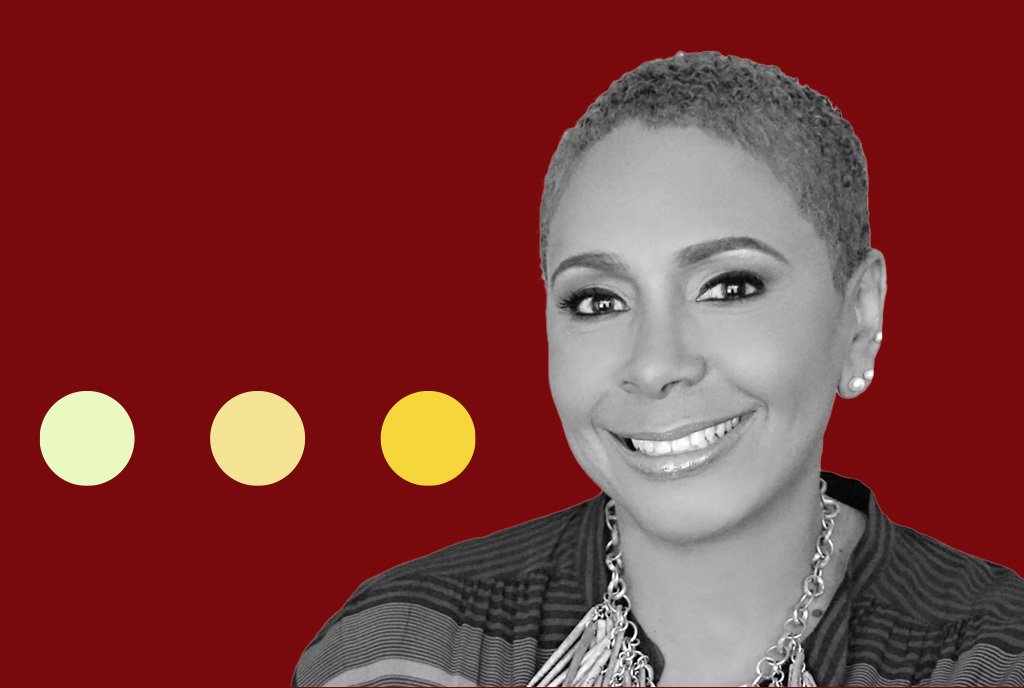The Leyada School gymnasium in Jerusalem was a sea of ponytails and pinneys on a recent Tuesday afternoon, as dozens of Israeli middle school girls battled it out on the basketball court for the day’s top honors.
The skidding of sneakers on polished wood and thud of basketballs meeting the floor were punctuated — and at times drowned out — by cheers, whistles and encouraging shouts from their coaches. The players, some of whom had spent hours traveling to the tournament, barely noticed at first when a similarly ponytailed, sneakered woman walked into the gym. But within a few minutes of Israeli First Lady Michal Herzog’s arrival, she was swarmed by players. Accompanying Herzog was Philadelphia 76ers co-owner Marjorie Harris. The two mingled with the players before handing out trophies for the first-of-its-kind basketball tournament for girls living in Israel’s periphery.
Harris, who owns the Philadelphia NBA team with her husband Josh, first got involved in youth sports in Israel more than a decade ago. “We decided we wanted to do something to help the Ethiopian community in Jerusalem and the whole country,” she explained to eJewishPhilanthropy before the tournament, “and we thought using the power of basketball would be a great tool and a great avenue.”
Soin 2015 the Harrises created the 48ers, a youth basketball league for boys. Since the founding, the couple has given in excess of $1 million toward the project, Josh Harris told eJP. Its name is a nod to the year of Israel’s founding, in the same vein as the Philadelphia 76ers. The Harrises soon joined forces with Liran Gerassi, the founder and CEO of The Equalizer, a nonprofit that incorporates sports and education into programming for Israelis who live in the country’s geographic, and often socioeconomic, periphery. As a college student in Jerusalem in 2009, Gerassi started a youth soccer program for at-risk students. Eventually, he was connected with the Harrises, and traveled to New York to meet with them.
The first teams they built together were mixed-gender, but primarily comprised of boys. “It was basketball combined with value-based activities and leadership development activities for youth…in disadvantaged communities across Israel,” Gerassi explained to eJP.
Over the years, Gerassi noticed an increasing demand for programming for girls. The Equalizer already had a girls’ soccer team, and he pitched the Harrises on creating a girls’ basketball program through the 48ers. Both Harris and Gerassi said it was an easy decision.
“For me, as the mother of two girls, and being involved in sports, there are a lot of sports for girls, but not enough,” Harris explained. “There are girls that play football, there are girls that play hockey — but not really. The big teams that girls participate in are soccer and now more and more basketball, and we thought [it was] a great way to empower girls.”
Harris grew up playing tennis in a family of sports fans. “I grew up in New York, so basketball and the Knicks was always sort of a thing. You know, in my house, my father and my brother were big [New York] Giants fans, they would live and die on a Sunday by whether the Giants won or not. And more times than not, they were disappointed. So sports was around me.”
Herzog lauded the girls basketball initiative, saying it would empower the participants.
“We at the President’s Residence are promoting the empowerment of women and girls in sports. A basketball game for women and girls is therefore a true celebration. I have no doubt that thanks to this wonderful initiative, hundreds, if not thousands, more girls in Israel will get to take part in sports, which are also educational and empowering, and this is wonderful news for the State of Israel, in general, and for its girls and women, in particular,” Herzog said in a statement.
Harris’ parents, both first-generation Americans whose families came from Europe, also put a high importance on educating their children about Israel. “We were definitely the type that would have dinner together every night,” she explained. “My dad would get home late, and we would either wait for him or sit with him. And I just remember… during the wars, it was a conversation that we had — we would talk about Israeli bonds, we would talk about the country.” The family first visited the country together in 1982.
As a college student, Harris volunteered on a kibbutz the summer before her senior year. “We don’t live here but we support it, and we feel very strongly that we get to live where we live, because there is the state of Israel,” she explained while in Jerusalem. “So it’s sort of our responsibility to make sure that we do what we can to support the country, and help keep it in the best way that it can be.”
Harris is also chair of the Sixers Youth Foundation, which partners with Philadelphia-area nonprofits that are focused on youth development in sports and education. “The thought behind it is [to] give [kids] the sports, get them hooked in and then give them the education,” Harris said. “And it’s interesting because they go so hand-in-hand. There’s studies that [show that] when you’re more active, you do better in school.”
“It was a really interesting moment when we bought the team because we realized very quickly that it wasn’t just owning a basketball team,” Harris continued. “It was about making sure that you were giving back to the community, and that people really enjoyed and got behind their team. And so it became, in our minds, a responsibility, because it’s a community asset.”
She defined the Harrises’ philanthropic efforts as “catalytic,” pointing out that both she and her husband have finance backgrounds. “We like to look at philanthropy like you look at a startup or a nimble business: How do you measure success?” she said. “And I think in philanthropy, people tend to get nervous about that. ‘If I don’t prove I’m doing well, they’re going to pull the money,’ which isn’t necessarily the case. It’s OK, well, how can we do it differently? How can we do it better? And so we like to think of ourselves as catalytic in that we can get behind in an organization, help them financially, get involved in ways that maybe we can be helpful with our experience, and then help them take off with the goal that they would eventually find other sources of income and grow and be a little more self-sufficient.”
There are currently nine teams in the girls’ program, with plans to more than double that number in the coming year. “They’re not used to having someone coming all the way from the States to visit them and to watch them play, having the first lady come to watch them play and be a part of the team. That’s something that they told us. The coaches told us that the girls are so happy to be here, to finally be part of a team, part of something bigger than them.”
Harris’ ultimate goal is to expand the girls’ program in Israel so that there are an equal number of girls’ and boys’ teams. Gerassi added that they are considering training the current players so that they can return later on as coaches and assistant coaches in an effort to encourage more girls to participate.
Sports, Harris said, is “an even playing field; it’s a place where it doesn’t matter what you look like, where you come from, what your religion is. It is the great equalizer, and it’s also a great bonder of people, because it’s a unified experience and purpose, and something people can really get behind.”
Credit:Source link



